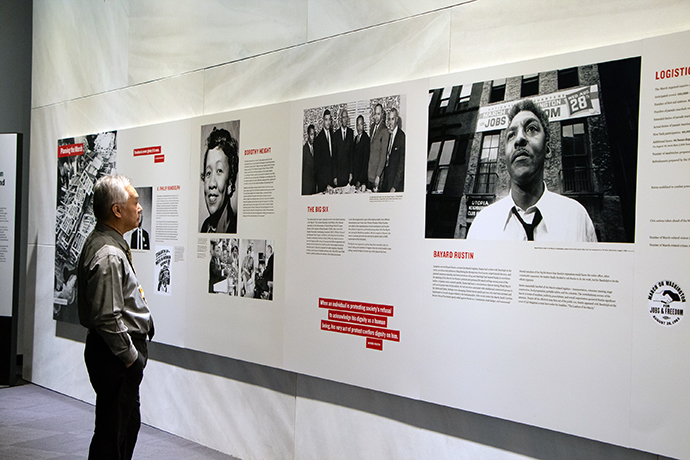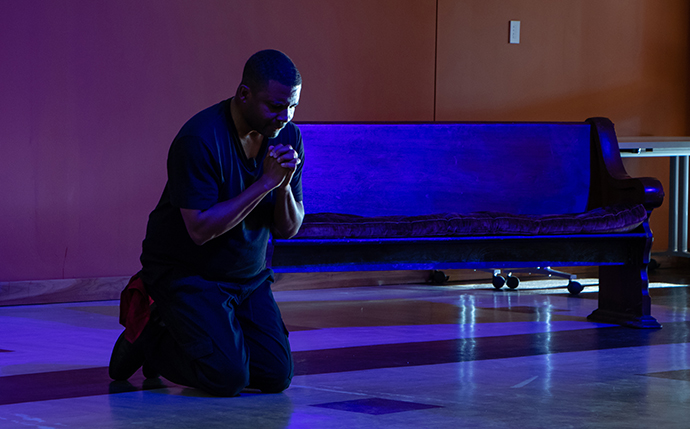Human beings sometimes “just need someone to hate on.”
That impulse is what allows the cycle of violence, alienation and rage to continue, said West Ohio Bishop Gregory V. Palmer.
But the Rev. Martin Luther King Jr. fought against the hate, he added, not as a singular voice but as someone who had the privilege to do so on behalf “of the hopes and the hurts of a particular group of people” in that space and time.
“He was able to stand in that breach and be a sign of God’s intention, to be used by God, to be a repairer of the breach,” the bishop proclaimed during the opening worship of the April 12-14 meeting of the United Methodist Board of Global Ministries.
The board’s directors spent part of their gathering observing the 50th anniversary of King’s assassination, celebrating the Atlanta native’s life and witness and remembering the mission agency’s “ongoing civil rights pilgrimage and commitment.”
In a memo, Thomas Kemper, top executive for Global Ministries, reminded the directors that the board’s predecessors were instrumental in bringing legislation to the 1992 General Conference to make King’s birthday an official holiday of The United Methodist Church.
Just as King linked the phrase “now is the time…” from his “I Have a Dream” speech to his hopes for racial justice, opportunity for all and a real democracy, so Global Ministries “will apply it to our current global agenda that includes justice, mercy and equality for all,” Kemper wrote.

Dr. Glenn Roy Villa Paraso, a director for the Board of Global Ministries, looks at an exhibit at the Center for Civil and Human Rights in Atlanta. Photo by Jennifer Silver, General Board of Global Ministries.
A collection of photos by Ken Thompson from the 1960s civil rights era is on display at the agency’s headquarters building through April 27.
Board directors took a field trip to the Martin Luther King Jr. Historic Site, which includes the Ebenezer Baptist Church, where King and his father served as co-pastors and his funeral was held. The King Center, the house where King was born and a visitor’s center with multimedia displays are all part of the site, too.
Palmer had reminded them that King was tormented in the time before his assassination because as he moved “out of the box,” beyond the confines of the civil rights movement, he started to represent more of a threat to the status quo.
After an April 4, 1967, speech about the Vietnam War at Riverside Church in New York, which drew criticism, King began “to connect the dots of the people who are affected by that war” — often the poor on either side — and also connected the dots through the Poor People’s Campaign.
“He was intentional about bringing this nation to true repentance about our relationship with the poor,” Palmer said.
Directors visited the Center for Civil and Human Rights in Atlanta, which also connects the dots — not just by telling the story of the African-American civil rights struggle but showing “how that movement is connected to every human rights struggle around the world,” explained Brian Tolleson, the museum’s interim chief executive.
The center was “first imagined,” according to its website, by the late Evelyn Lowery, a United Methodist civil rights leader and wife of the Rev. Joseph Lowery, and former U.N. Ambassador Andrew Young and was launched by former Atlanta Mayor Shirley Franklin.
Global Ministries already has formed connections with the museum, where it held a press conference in December 2016 in support of the Standing Rock Sioux Tribe, and Tolleson invited all the directors to become partners of the center. “We still have a long way to go,” he said. “But the lesson that Dr. King taught us is that human dignity is non-negotiable.”

Playwright and actor Mike Wiley in a performance of his one-man play, “Blood Done Sign My Name,” during the April 12-14 meeting of the Board of Global Ministries. The play is based on the book by Timothy Tyson. Photo by Jennifer Silver, General Board of Global Ministries.
On April 13, the last evening of the board meeting, Global Ministries hosted a production by playwright and actor Mike Wiley of “Blood Done Sign My Name.”
The one-person play, which also featured gospel singer Mary D. Williams, is based on a memoir by United Methodist Timothy B. Tyson. It tells the story of a racially charged murder in Oxford, North Carolina, in 1970, when Tyson was 10 years old.
In a panel discussion after the performance, Wiley said that when he adapted the book, he expanded upon it, to make the play “a story of where we are now.”
Quest Hunter, a young church and community worker with Global Ministries, pointed out that while such violent racism has subsided, discrimination has become institutionalized. “What this play reminded me of is we’re still fighting some of the same issues over and over,” she said.
Like Tyson, the Rev. Bernice Kirkland, district superintendent for the Atlanta College Park District, was 10 years old in 1970 and saw how her older siblings experienced racism in Mississippi.
Even today, she noted, the American people have not owned up to the national legacy of racism. “We have not had the opportunity to experience true reconciliation and repentance and therefore change,” she added.
In 1977, Palmer actually served in Oxford as a student pastor at St. Peter’s United Methodist Church, one block from the church where Tyson’s father was pastor. One of the differences he finds in the racial tension then and now, he said, is “there are simply more demographic groups that are targeted.”
The question Palmer left listeners with during the board meeting’s opening worship was not what King did “but what will we do?”
The bishop said he prays for all to have the faith and courage to join God’s unambiguous call “to stand in the gap of violence, of poverty, of walls that are keeping people apart.”
Bloom is the assistant news editor for United Methodist News Service and is based in New York.
Follow her at https://twitter.com/umcscribe or contact her at 615-742-5470 or [email protected]. To read more United Methodist news, subscribe to the free Daily or Weekly Digests.
Like what you're reading? Support the ministry of UM News! Your support ensures the latest denominational news, dynamic stories and informative articles will continue to connect our global community. Make a tax-deductible donation at ResourceUMC.org/GiveUMCom.

